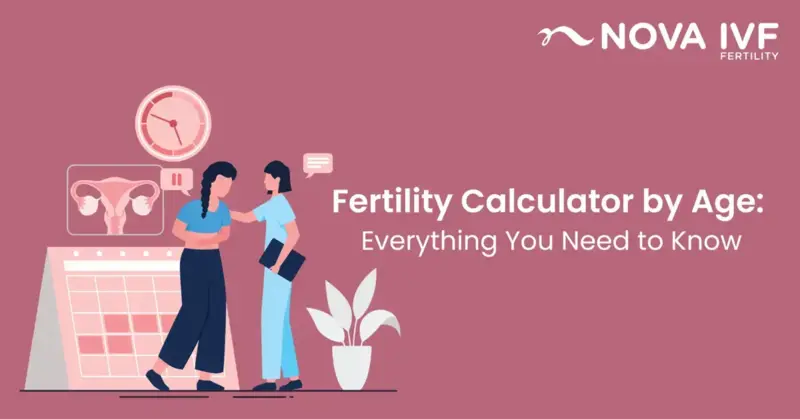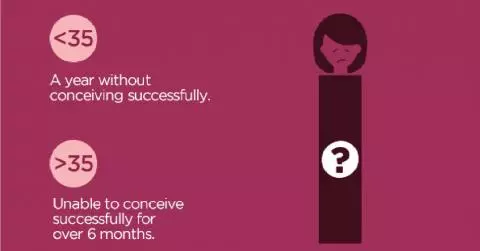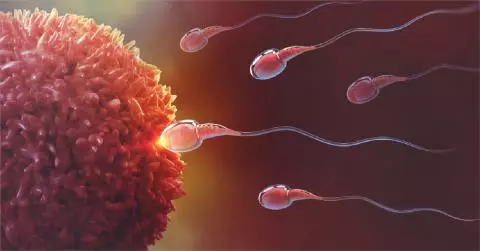Fertility Calculator by Age: Predict Your Chances of Conceiving

Although a simple concept, family planning can be quite complex. According to research, mid-to late 20s is the peak fertility age of a woman. During this time, they have a higher number of normal eggs over abnormal ones in their ovaries, which increases their chances of a healthy pregnancy.
This article will serve as a guide for ovulation calculator by age and your fertility rate. If you want to learn about the calculator for knowing chances of getting pregnant by age, keep reading.
Calculate Your Fertility by Age
Every girl child is born with a fixed number of eggs (about 1-2 million) in her ovaries. As a female gets older, the number of eggs in her reserve decrease naturally with each passing period. Besides, the quality of these eggs also declines with increasing age. In addition to all this, many women are likely to develop health problems, such as uterine fibroids or endometriosis, that further impact their fertility.
Your doctor can calculate your fertility by conducting various tests and going through your medical history. However, you can get a basic understanding of how your fertility declines over time with the knowledge shared below.
Did you know that your ovulation cycle significantly impacts the chances of successful conception? Tracking your ovulation cycle among other things can help you plan a family.
Odds of Getting Pregnant by Age Chart
The table below shows the changes of a woman conceiving a child within 1 year:
| Age in years | Chances of Conception |
| Younger than 30 | Approx 85% chances of conceiving within 1 year |
| 30 | Approx 75% chances of conceiving within 1 year |
| 35 | Approx 66% chances of conceiving within 1 year |
| 40 | Approx 44% chances of conceiving within 1 year |
The data represented below shows the average likelihood of a woman getting pregnant naturally in each month as per her age:
| Age in years | Chances of natural conception each month by age |
| 25 | 25% |
| 30 | 20% |
| 35 | Less than 15% |
| 40 | Less than 5% |
The chances of a woman getting pregnant decline gradually as she ages due to the effect of aging on her reproductive system. There is not a sudden drop in your fertility as you turn 30 or 35, it happens gradually over time as you age. Besides, older women are more likely to experience a miscarriage than younger women. Approximately 16% of pregnancies end in a miscarriage if the woman is 30 years or younger, and about 27% of pregnancies end in a miscarriage if the women are about 40 years old.
According to research, the ideal age to start planning a family at the latest when the woman is at age 32 if you want 1 child, at age 27 if you want 2 children, and at about age 23 if you want 3 children.
For a healthy couple in their 20s or early 30s, about 1 in 4 women is likely to get pregnant in any single menstrual cycle. This number declines to 1 in 10 by the time a woman turns 40 or older.
How Age Affects Fertility in Women?
Aging is a natural phenomenon that affects all aspects of every human life, including a woman’s fertility. Although it is possible for a woman to get pregnant in the later stages of her life, especially with assisted reproductive technologies (ART), age has a big influence on the chances of a healthy pregnancy.
Over the lifespan of a woman, about 500 eggs are ovulated from the 1 to 2 million eggs that she was born with; the rest normally disappear after undergoing follicular atresia. The quantity and quality of a woman’s egg supply decreases over time as she ages. This means that abnormal eggs won’t get fertilised and even if an egg gets fertilised, it has a high chance of not being implanted properly in the womb at a late stage in life.
Age has a significant impact on your fertility, both in natural and assisted reproduction. Delayed childbearing has increased over the past couple of decades so much so that 30 is the average age of women in Europe of having a first child. Many people are actively deciding to have children in their late 30s or 40s. But the aging body may not be able to support a healthy pregnancy. The changes due to aging on your skin, for example, are visible, but you can’t see or feel the changes happening in your reproductive system.
Menopause is an inevitable phase of a woman’s life, during which the egg reserve of a woman is reduced to a few hundred. The eggs are not released regularly during and after menopause, which makes it extremely difficult to conceive. All women experience menopause during age 45 to 55.
Several reasons can influence your decision of having a child in your 20s or not at all. However, delayed pregnancies lead to a high number of women experiencing fertility problems as well as the risk of complication during and after pregnancy for you and your child.
Advanced maternal age is associated with difficulty in conceiving, such as prolonged time to conceive. By age 30, the fertility of a woman starts to decline; the decline happens rapidly once the woman has reached her mid-30s. By age 40, it becomes highly unlikely for a woman to become pregnant, especially naturally.
Age and Fertility: Getting Pregnant at an Older Age
Now that you understand that fertility declines with increasing age after a certain period, you can comprehend the challenges faced by older women in conceiving a child. Many women are able to carry a healthy pregnancy well into their 30s and 40s, but peak fertility of a woman is around her mid-to-late 20s. The depreciation in the quantity and quality of a woman’s egg reserve leads to age-related infertility, aneuploidy (discussed later in detail), miscarriages.
Assisted reproduction technologies are useful in case of older woman who are trying to conceive; however, it is best to start as early as possible. In case you are not sure whether you want to conceive in right now, when your eggs are healthy and you have optimum fertility, you can consider freezing your eggs to be used later. If you are older than 35 and are facing troubles with conceiving naturally, your obstetrician-gynaecologist may recommend you go for an infertility evaluation. This can help clarify the exact cause of failed conception and enable you to seek further help. Talking to a fertility expert, such as skilled doctors from the team of Nova IVF Fertility.
Women who become pregnant at an advanced reproductive age have a higher risk of complications compared to women who conceive in their 20s or early 30s. There is a gradual increase in the risk of developing complication in your pregnancy with increasing age. Women aged 40 years or older have an increased risk of developing preeclampsia, for example, if they become pregnant. Additionally, there is also an increased risk of health problems for the foetus of women who get pregnant later in life.
Does your chance of getting pregnant decrease with age?
Yes. A woman’s fertility decreases as she ages, but it is possible for her to get pregnant at an older age as well. ARTs, such as IVF, can be of great help in achieving this goal.
After a woman reaches about 37 years of age, the chances of a normal egg to be released every month drops down significantly. Besides, not all normal eggs get fertilised and lead to a healthy pregnancy. Additionally, there are numerous factors that influence the chances of a successful pregnancy, including the receptivity of the uterus towards an embryo.
Rate of Aneuploidy by Age
Aneuploidy is defined as an abnormality in the number of chromosomes in a cell due to duplication or loss; usually 46 chromosomes are present in every cell. An egg is also a cell that normally contains 46 chromosomes. If the number of chromosomes is higher or lower than the usual 46, that cell is considered to be aneuploid.
Upon reaching age 35, women experience a high aneuploidy rate, which further increases significantly as they turn 40. At 40 years old, most of the eggs of a woman are aneuploid or abnormal. Success chances of an IVF cycle in women in their early 40s is quite low. Thus, it is better to start as early as possible.
Lifestyle Changes to Improve Fertility
By implementing certain lifestyle changes, such as the ones mentioned below, you may be able to improve your fertility.
- Maintain a healthy weight
- Eat a balanced diet
- Exercise regularly
- Monitor and control your stress levels
- Quit smoking
- Reduce your caffeine and alcohol intake or abstain from them
When to Consult a Fertility Specialist?
There are usually two scenarios when you ought to consider a fertility specialist:
- When you are facing problems in conceiving naturally
People who are trying to conceive a baby but seem to experience no luck are advised to consult with a fertility specialist. This can help understand the root cause of the problem and lead to
- When you are not ready to have children right now, but may want them later
If you are not sure about when you may want to start a family or don’t want to have children at the moment, freezing your eggs is worth considering. You can contact a fertility specialist to understand the procedure in more detail and discuss your fertility goals.
Conclusion
The peak of a woman’s fertility is achieved in her mid-to-late 20s. Thus, trying to start a family at an early age is more advantageous from physical standpoint. However, all women may not have the resources or may not want to conceive early on. It is less likely to have your child affected by birth defects or face fertility issues yourself when you have a child in ages 18 to 30, for example. As you age, your fertility declines and the chances of you experiencing a miscarriage or unhealthy pregnancy increase. Additionally, the chances of you conceiving decline gradually as you age.
As women all over the world are gradually choosing to delay childbearing, many couples are experiencing infertility issues. But that does not mean that you can’t conceive in your 30s. Many women get pregnant naturally in their 30s and 40s. However, if you are experiencing troubles getting pregnant, it is best to consult a fertility specialist, such as doctors from Nova IVF Fertility. Doing so, significantly increases your chances of a successful pregnancy. However, make sure to consult a fertility specialist before or in your early 40s as your menopause is likely to start between ages 45 and 55.
FAQS about Fertility Calculator by Age
Q. How can I calculate my fertility by age?
A. Your chances of getting pregnant depend highly on your age. Women who are in their mid-to-late 20s have the highest fertility rates; they have approx 25% chances of getting pregnant each month. You can get more information about your fertility in the article or contact fertility experts for an in-depth fertility assessment.
Q. Can age and fertility calculators be used by men as well to determine their fertility?
A. Although increasing age also affects men’s fertility rate, the impact is not as predictable and significant as the impact of age on women’s fertility. Besides, fertility calculators are usually designed to get insights about the women’s fertility. In order to know about the fertility status of men, you are advised to consult a fertility specialist who may recommend a series of tests to find out why.
Q. How accurate are online fertility calculators age?
A. Online conception age calculators provide a general idea about one’s fertility, but the results should be taken as general information and not as medical counselling. You are advised to consult a doctor or a fertility specialist to get proper guidance on your fertility goals.
Q. What are the common infertility tests for women?
A. Blood tests to measure hormone levels, pelvic ultrasound, etc. are some examples of common infertility tests that your doctor may recommend for finding out the root cause of your infertility problems.
 Infertility Counselling
Infertility Counselling Female Infertility Treatment
Female Infertility Treatment Andrology Treatment
Andrology Treatment Fertility Enhancing Surgeries - Female
Fertility Enhancing Surgeries - Female Fertility Enhancing Surgeries - Male
Fertility Enhancing Surgeries - Male Endoscopy Treatment
Endoscopy Treatment IUI Treatment
IUI Treatment IVF Treatment
IVF Treatment ICSI Treatment
ICSI Treatment Advanced IVF Solutions
Advanced IVF Solutions Embryology
Embryology Vitrification Egg, Embryo, Sperm Freezing
Vitrification Egg, Embryo, Sperm Freezing Preimplantation Genetic Testing (PGT)
Preimplantation Genetic Testing (PGT) Donation Program Embryo / Egg / Sperm
Donation Program Embryo / Egg / Sperm Self-cycleTM IVF
Self-cycleTM IVF

 Self-cycleTM IVF
Self-cycleTM IVF









